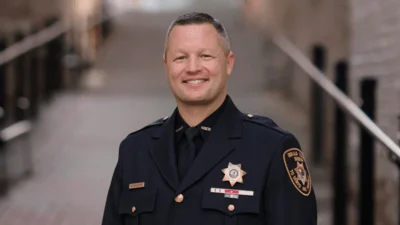City of Sycamore City Council met April 16.
Here is the minutes provided by the council:
ROLL CALL
Mayor Lang called the meeting to order at 7:00 p.m. and City Clerk Mary Kalk called the roll. Those Alderpersons present were: Alan Bauer, Steve Braser, Nancy Copple, Josh Huseman, Rick Kramer, Pete Paulsen, Virginia Sherrod, and Chuck Stowe. City Attorney Keith Foster was also present.
PLEDGE OF ALLEGIANCE – Led by Maggie Peck
APPROVAL OF AGENDA
MOTION
Alderperson Braser motioned to approve the agenda and Alderperson Kramer seconded the motion.
VOICE VOTE
Mayor Lang called for a voice vote to approve the motion. All Alderpersons voted aye. Motion carried 8-0.
AUDIENCE TO VISITORS via email
1. Samantha Szymanski, 1830 Brower Place, Sycamore, asked for a moratorium on small cells and other wireless infrastructure permits and deployment until the COVID-19 emergency is over.
CONSENT AGENDA
A. Approval of the Minutes for the Regular City Council Meeting of March 16, 2020. B. Payment of the Bills for April 6, 2019 in the amount of $1,198,285.87.
MOTION
Alderperson Bauer moved to approve the Consent Agenda and Alderperson Stowe seconded the motion.
ROLL CALL VOTE
Mayor Lang called for a roll call vote to approve the motion. Alderpersons Bauer, Braser, Copple, Huseman, Kramer, Paulsen, Sherrod, and Stowe voted aye. Motion carried 8-0.
PRESENTATION OF PETITIONS, COMMUNICATIONS, AND BILLS
A. A Proclamation Declaring April 7, 2020 as National Service Recognition Day in the City of Sycamore, Illinois. B. A Proclamation Declaring April 2020 as Child Abuse Prevention Month in the City of Sycamore, Illinois.
REPORT OF OFFICERS
City Manager – Brian Gregory said with the new technology for the meeting, the agenda does not include action items as all ordinances are here on First Reading and we have a public hearing. He thought it was most prudent to use and work through the technology to make sure it’s as transparent as possible and that it is consistent with the Governor’s
Executive Order and the intent of the Open Meetings Act. He said that he appreciates that the Daily Chronicle and WLBK is logged on to the meeting. We will not have the department head updates tonight but said their focus has been on the COVID- 19 emergency which includes efforts to protect both our employees and residents in any way we can. Buildings are locked down and the staff is doing everything they can to adjust to this ever-changing and fluid situation. He encourages everyone to follow Center for Disease Control (CDC), DeKalb County Health Department, and State Department of Public Health guidelines. There is a COVID-19 update tab on the top of the homepage on the City’s website at www.cityofsycamore.com. They have been using social media and that tab to get information out to the residents. He reported that there will not be a Planning and Zoning Commission meeting next Monday. It will be rescheduled as they wanted to work through technology first. In order to help our local businesses, the liquor licenses will auto-renew on May 1st with the fee due August 1st. They are extending payments for the local taxes as well as payment penalties for water bills and parking tickets to June 30th, at this point. Another item to help local businesses is that they are reviewing the Downstate Small Business Stabilization Program through the Department of Commerce and Economic Opportunity (DCEO). This is a grant program for non-essential businesses that the city applies for on an individual basis with the DCEO which requires a public hearing and a resolution for each application. With that in mind, we may have to have special meetings to help facilitate and expedite that process.
REPORTS OF STANDING COMMITTEES
Finance – Alan Bauer - no report
Public Safety – Pete Paulsen - no report
Public Works – Chuck Stowe - no report
PUBLIC HEARINGS
A. Public Hearing on the Proposed FY2020-21 City Budget.
Mayor Lang opened the public hearing. Hearing no comment, he closed the public hearing.
ORDINANCES
A. Ordinance 2019.53—An Ordinance Concerning the Adoption of the Combined Budget and Appropriation Ordinance for the Fiscal Year 2020-21 in the City of Sycamore, Illinois. First Reading.
City Manager Brian Gregory said what they have prepared and presented at the last meeting as a consideration was the entire FY21 budget. That budget is anticipated being balanced in the form that it is presented. We understand that COVID-19 will have an impact on that budget. Staff is recommending to pass that budget, although it is here on First Reading only, and then they will assess the impact of emergency as they go along and make any changes necessary via budget amendments throughout the year. The fee increases that were discussed, notably the infrastructure and radium fee on the water side will not come forward. He is recommending to table it and review it in a year. They will use reserves for the radium and since the infrastructure fee was for long term planning, they thought it to be most prudent to be sensitive to the circumstances and table those fees for discussion at a later date.
Alderman Huseman asked which line items might be impacted.
City Manager Brian Gregory said about 45% -50% of the budget is General Sales Tax and Use Tax. The City has worked very hard to preserve a fund balance position knowing that we are susceptible to waves of Sales Tax fluctuations. That is why we want to put the budget in place as is. There will be a few things, like new hires, that will have to be deferred until later time after they can reassess. It’s hard to know what the impact will be but they are trying to be a partner in this with the residents and businesses.
B. Ordinance 2019.54—An Ordinance Amending Title 1, “Administration,” Chapter 10, “Personnel Rules,” of the City Code of the City of Sycamore to Authorize Non-Elective Positions for the City of Sycamore, Illinois. First Reading.
City Manager Brian Gregory said this ordinance codifies the number of employee positions that the budget proposes. The plan would be to continue forward as the budget had been contemplated and discussed over the last meetings, however, they will defer new hires that were contemplated until they can reassess what the impact is. It’s hard to say how long the emergency will continue but their focus needs to be more on helping our businesses, employees, and residents get through the emergency healthy and hopefully in a sustainable position.
Alderperson Copple asked about the non-elective positions and the terminology.
City Manager Brian Gregory said the non-elective are those positions that are not statutory elected positions. The City Code outlines the Mayor, City Clerk, and Aldermanic positions. The other staff positions would be set forth via ordinance. The budget narrative also outlines that table. The elected positions are in the City Code and are decided every four years. Any review of changes requires a 180 days out or the October before an election.
C. Ordinance 2019.55—An Ordinance Establishing Offices and Fixing the Compensation of Certain Appointed Officers of the City of Sycamore, Illinois, County of DeKalb, State of Illinois for the Fiscal Year Commencing on the First Day of May 2020 and Ending on the Thirtieth Day of April, 2021. First Reading.
City Manager Brian Gregory said this establishes the salary ranges of those employees not represented by a collective bargaining agreement.
D. Ordinance 2019.56—An Ordinance Amending Title 3, “Business and License Regulations,” Chapter 2, “Liquor Control,” Subsection 6, “Classification of Licenses; Fees; Hours and Days of the City Code of the Sycamore of Sycamore, Illinois. First Reading.
City Manager Brian Gregory said these are the changes that were discussed at the last meeting and this ordinance would contemplate four changes to the liquor code, as follows per the agenda:
ClassB License, Optional Annual Catered Events Permit
Class B license holders have the option to receive an annual permit for indoor catered events for an additional annual fee of one hundred dollars ($100.00). This additional license holder would receive an annual permit and would waive the requirement to obtain a permit for each indoor catered event.
Banquet Hall Liquor License
"Banquet Hall" shall mean a business conducted on premises at which the exclusive activity is the catering of private parties where there is service for consumption at tables of a full multiple course meal at a prearranged fixed unit price, or hors d'oeuvres, buffet or smorgasbord, and at which alcoholic liquor may be served or sold as an incident to such food services; provided that each of such private parties is prearranged under the sponsorship of a particular person or organization.
Class “L” License (Banquet Hall) shall authorize the serving and retail sale of alcoholic liquor for consumption on the premises designated therein in establishments containing banquet hall facilities and authorized for banquets as a principal use; provided that alcoholic liquor under this license may be served and sold only to invited guests. The annual fee for Class L licenses shall be two thousand dollars ($2,000.00).
Tasting Room
Class M, which shall authorize the holder of a Class D liquor license from the City to operate a tasting room for the sale of craft beers only for consumption on the premises. It is the intention of a Class M liquor license that the craft beer tasting room shall be an amenity and an accessory use to the primary business (Class D liquor license sales) operated by the applicant on the premises. The tasting room must be physically separated from the Class D licenses premises by walls with access through a door from the Class D licensed area. A Class M liquor license shall be subject to the following conditions and restrictions:
a. The tasting room shall only sell craft beers for consumption on the premises. No macro beers or other alcoholic liquors shall be sold for consumption on the premises from the tasting room. Craft beers for consumption on the premises may only be sold from the tasting room and not from the primary Class D licensed premises.
b. The primary Class D licensed premises may sell craft beer as a packaged item for off-site consumption. The sale of packaged goods from the tasting room is prohibited.
c. Customers may only consume the craft beers purchased in the tasting room on premises. No customer may leave the licensed premises with open alcohol.
d. The tasting room shall be limited in size to no more than 50 square feet. The tasting room must have a continuous, unobstructed passage and view to the primary Class D licensed premises.
e. No seating will be allowed in the tasting room area.
f. The tasting room shall be limited to no more than eight operational craft beer taps at one time.
g. The hours of operation of the tasting room shall be limited to 3:00 p.m. to 10:00 p.m. on all days, unless specific permission for additional hours of operation are granted by the liquor commissioner.
h. The license holder must inform the local liquor commissioner at least 48 hours in advance of any special events where larger than normal crowds are expected. Special events may include, but are not limited to, the release of rare, specialty craft beers. The license holder shall obtain a special event permit.
Tasting sizes for sale are limited to the following quantities:
i. By the glass, having a capacity of not more than 4 ounces.
ii. By the flight, having not more than three glasses with each glass containing a capacity of not more than four ounces.
i. All persons serving craft beers in the tasting room for consumption on the premises must be BASSET certified.
j. The tasting room shall comply with all building, fire and other codes of the city.
The annual fee for Class M licenses shall be two hundred and fifty dollars ($250.00).
Video Gaming Café
3-2-1. Net Income from Vendors: money put into a video gaming terminal or any other vendor operating/owned machine, minus credits paid out to players.
3-2-6-A-3. Class B; Bar: Class B licenses authorize the retail sale of alcoholic liquors where the primary purpose of the establishment is for the on-site consumption of such alcoholic liquors on the premises, where food service may or may not be included. This license shall apply to establishments where the sale of alcoholic beverages for consumption on premises constitutes at least eighty percent (80%) of the gross annual receipts for alcoholic beverages. Bars may also sell package liquors, but under no circumstances may a bar be converted to a package goods store unless the location is in conformance with the provisions of this Code and by the licensing authority of the Illinois Liquor Control Commission. The annual fee for Class B licenses shall be two thousand dollars ($2,000.00). Bars that sell package goods shall pay an additional annual fee of two hundred fifty dollars ($250.00). Bars with State video gaming licenses must generate at least fifty one percent (51%) of its income from beverage and food sales and dedicate no more than twenty five percent (25%) of floor space to video gaming in order to maintain eligibility for a Class B license. For purposes of calculating “income,” the City will use the actual profit derived from beverage and food sales and the net income from vendors of video gaming terminals or any other machine owned or operated by a vendor. Therefore, the actual profit derived from beverage and food sales must be at least fifty one percent (51%) percent of the total economic activity entering the licensed establishment, including any vendor operated devices. The purpose of this calculation is to ensure that any licensee with a Class B license maintains the sale of alcoholic liquor as its primary business function and source of revenue.
He said again that no action will be taken tonight and that all these ordinances will be brought back on April 20th for action. Alderman Kramer asked if the Banquet Hall license includes the private clubs.
City Manager Brian Gregory said that clubs would be covered by a Class C license. The Class L License would be if Blumen Gardens or St. Mary’s wanted to establish another banquet hall in town. It would allow them to provide the service versus having a bar cater the service.
RESOLUTIONS- None
CONSIDERATIONS- None
APPOINTMENTS
OTHER NEW BUSINESS
ADJOURNMENT
MOTION
Alderperson Stowe moved to adjourn the meeting at 7:35 p.m. and Alderperson Paulsen seconded the motion.
VOICE VOTE
Mayor Lang called for a voice vote to approve the motion. All Alderpersons voted aye. Motion carried 8-0.
https://cityofsycamore.com/wp-content/uploads/2020/04/cc20200406m.pdf






 Alerts Sign-up
Alerts Sign-up